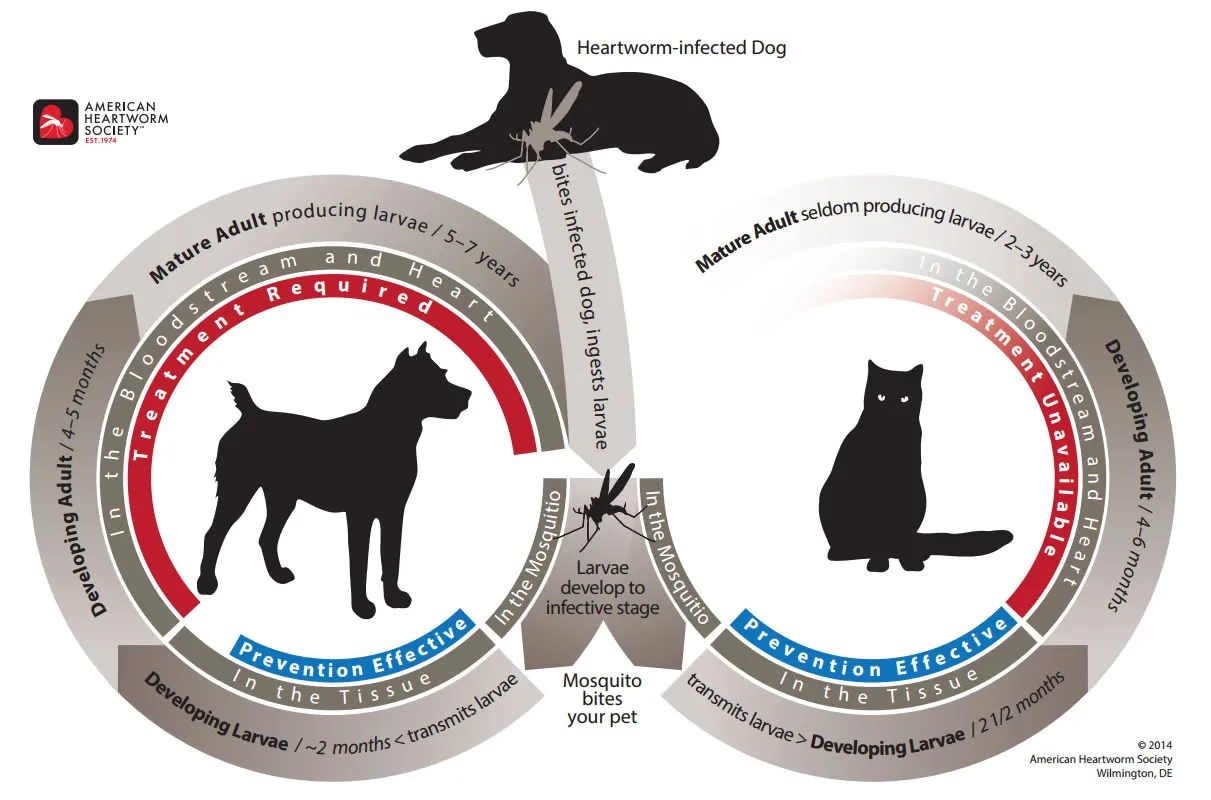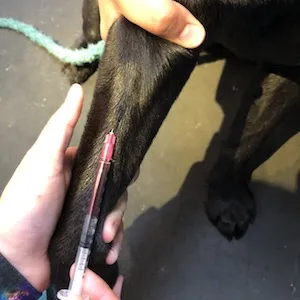Heartworm disease is a severe and potentially fatal condition that affects dogs in the United States and many other parts of the world. Caused by foot-long worms that reside in the heart, lungs, and associated blood vessels, it can lead to severe lung disease, heart failure, and damage to other vital organs. As a responsible dog owner, understanding the ins and outs of Heartworm Medication For Dogs – from effective prevention strategies to necessary treatment protocols – is crucial for safeguarding your pet’s health and ensuring a long, happy life. This comprehensive guide will delve into the disease, its transmission, symptoms, and the critical role of veterinary care and appropriate medication in combating this pervasive threat.
The dog serves as a natural host for heartworms, meaning these parasites can mature, mate, and reproduce within the canine body. If left untreated, the number of worms can escalate, with some dogs harboring hundreds of parasites. The damage inflicted by heartworms on the heart, lungs, and arteries can be lasting, impacting a dog’s overall health and quality of life even after the worms are gone. Therefore, heartworm prevention for dogs is undeniably the best approach, and when treatment becomes necessary, it should be initiated as early as possible in the disease’s progression.
The Life Cycle and Transmission of Heartworm Disease
The mosquito plays an indispensable role in the transmission of heartworm disease. Adult female heartworms residing in an infected animal, such as a dog, fox, coyote, or wolf, produce microscopic offspring called microfilaria. These microfilariae circulate in the bloodstream of the infected host. When a mosquito bites an infected animal and consumes a blood meal, it picks up these microfilariae.
Over a period of 10 to 14 days, inside the mosquito, these baby worms develop and mature into “infective stage” larvae. Subsequently, when the infected mosquito bites another dog, cat, or susceptible wild animal, it deposits these infective larvae onto the surface of the new host’s skin. The larvae then enter the animal’s body through the mosquito’s bite wound. Once inside the new host, it takes approximately six months for these larvae to develop into sexually mature adult heartworms. Adult heartworms can live for 5 to 7 years in dogs. Due to their longevity, each mosquito season can lead to an increased number of worms in an infected pet, making consistent prevention vital.
Recognizing the Signs of Heartworm Disease in Dogs
In the initial stages of heartworm disease, many dogs exhibit minimal or no symptoms, making early detection challenging without regular testing. However, as the infection persists and progresses, symptoms are more likely to manifest. Dogs that are highly active, heavily infected, or have pre-existing health conditions often display more pronounced clinical signs.
Common signs of heartworm disease can include a mild, persistent cough, a reluctance to exercise, noticeable fatigue after moderate physical activity, decreased appetite, and unexplained weight loss. As the disease advances, pets may develop signs of heart failure, such as a swollen belly due to excess fluid accumulation in the abdomen. In severe cases, dogs with a large number of heartworms can experience a sudden blockage of blood flow within the heart, leading to a life-threatening form of cardiovascular collapse known as caval syndrome. This acute condition is characterized by a sudden onset of labored breathing, pale gums, and dark bloody or coffee-colored urine. Without immediate surgical removal of the heartworm blockage, the prognosis for dogs with caval syndrome is unfortunately poor. For more information on general health concerns, you might consider articles on topics such as home remedies for sneezing dog.
 A close-up image showing various heartworms, illustrating the severity of the parasitic infection in pets
A close-up image showing various heartworms, illustrating the severity of the parasitic infection in pets
The Critical Role of Heartworm Testing and Annual Check-ups
Heartworm disease is a serious and progressive condition, and the sooner it is detected, the better the chances for a successful recovery. Since early signs of infection are often absent in dogs, cats, or ferrets, regular heartworm testing administered by a veterinarian is critically important. This test requires only a small blood sample from your pet and works by detecting the presence of heartworm proteins. Many veterinarians can process these tests in-house, while others send samples to diagnostic laboratories, with results typically obtained quickly. If your pet tests positive, further diagnostic tests may be recommended to assess the severity of the infection.
All dogs, regardless of their perceived risk, should be tested annually for heartworm infection. This can usually be incorporated into a routine preventive care visit. For puppies under 7 months of age, heartworm prevention can be initiated without an immediate test, as it takes at least six months for a dog to test positive after infection. However, puppies should be tested six months after their initial vet visit, again six months later, and then annually to confirm they remain heartworm-free. Adult dogs over 7 months of age who have not been on a preventive medication require testing before starting prevention, followed by retesting at 6 and 12 months, and then annually. If you miss a dose or administer preventive late, immediately consult your veterinarian and restart the monthly preventive, with a retest recommended six months later. Annual testing remains necessary even for dogs on year-round heartworm prevention to ensure the program’s effectiveness, as no medication is 100% foolproof.
 A detailed illustration depicting the complete life cycle of heartworms, from mosquito transmission to adult worms in a host
A detailed illustration depicting the complete life cycle of heartworms, from mosquito transmission to adult worms in a host
Heartworm Medication for Dogs: Prevention is Key
Preventing heartworm disease is significantly easier, safer, and less costly than treating an established infection. Heartworm medication for dogs comes in various forms to suit different pet needs and owner preferences. These include monthly chewable tablets, topical “spot-on” medications, and injectable formulations that can provide protection for 6 or 12 months. All approved heartworm medications function by eliminating the immature (larval) stages of the heartworm parasite, including the infective larvae deposited by mosquitoes and the subsequent larval stage that develops within the animal. It’s crucial to administer these preventives strictly on schedule, as larvae can quickly molt into juvenile adult stages within as little as 51 days, which are no longer effectively eliminated by preventives.
Heartworm preventives are prescription medications, as mandated by the U.S. Food and Drug Administration (FDA). This requires a licensed veterinarian to prescribe the medication, often after performing a heartworm test to ensure your pet is not already infected with adult heartworms. Giving preventives to an infected dog can, in rare instances, lead to severe reactions. Puppies and kittens can typically start preventives as early as 8 weeks of age, or when ferrets weigh at least two pounds, without an initial test, as adult heartworms take approximately six months to develop. The dosage of heartworm medication is based on body weight, not age, so regular weigh-ins during rapid growth phases are important.
Many modern heartworm preventives offer added benefits by also protecting against various intestinal parasites such as hookworms, roundworms, whipworms, and tapeworms. Some products even provide protection against external parasites like fleas, ticks, and mites. However, no single product covers all parasites, so consulting your veterinarian is essential to determine the best multi-parasite prevention plan for your dog. For managing external parasites specifically, you might be interested in exploring options like an all natural flea and tick killer.
The American Heartworm Society strongly recommends year-round prevention for all pets, regardless of geographical location or climate. Heartworm disease has been diagnosed in all 50 states, and risk factors are unpredictable. Even in areas with cold winters or dry, arid climates, environmental factors, wildlife carriers (coyotes, foxes), and migrating mosquitoes contribute to the spread. Indoor pets are also at risk as infected mosquitoes can easily enter homes. Unfortunately, there is no commercially available vaccine for heartworm disease, nor are there proven effective natural preventions, making FDA-approved medications the only reliable method.
 A map highlighting the incidence of heartworm disease across various regions, indicating areas of higher risk
A map highlighting the incidence of heartworm disease across various regions, indicating areas of higher risk
What to Expect if Your Dog Tests Positive for Heartworms
Receiving a positive heartworm diagnosis for your dog can be distressing, but the good news is that most infected dogs can be successfully treated. The primary goals of treatment are to stabilize your dog if they are showing symptoms, eliminate all adult and immature worms, and minimize potential side effects.
Here’s a breakdown of the typical treatment process:
- Confirm the Diagnosis: Since heartworm treatment is both costly and complex, your veterinarian will usually confirm an initial positive antigen test with an additional, different test to ensure accuracy.
- Restrict Exercise: As soon as the diagnosis is confirmed, your dog’s physical activity must be severely restricted. Physical exertion increases the rate at which heartworms damage the heart and lungs. The more severe the symptoms, the less activity your dog should engage in.
- Stabilize Your Dog’s Condition: Before the actual heartworm treatment can begin, your dog’s overall health may need to be stabilized through appropriate therapies. This preparatory phase can take several months in cases of severe heartworm disease or when other serious conditions are present.
- Administer Treatment: Once your dog is stable, your veterinarian will recommend a multi-step treatment protocol, often guided by the American Heartworm Society’s guidelines. The only FDA-approved drug for treating adult heartworm infections in dogs is melarsomine, administered via injection at the veterinary hospital. While there are risks, most adult worms die quickly within 1 to 3 months. Alongside melarsomine, other medications may be prescribed to improve treatment success and reduce side effects, including administering a heartworm preventive for two months prior to melarsomine to prevent new infections and eliminate circulating microfilariae. Long-term use of preventives alone is not an alternative to melarsomine for treating existing adult infections, as it allows continued damage to the heart and lungs.
- Post-Treatment Monitoring and Prevention: Approximately nine months after treatment completion, your veterinarian will perform a heartworm test to confirm that all heartworms have been eliminated. To prevent re-infection, it is crucial to administer heartworm prevention year-round for the remainder of your dog’s life. If your dog still tests positive four months after treatment, further evaluation and potentially a second course of treatment may be necessary, as it can take longer for the antigen to clear or for all worms to be eliminated. If you’ve missed two months of prevention, restart it immediately and retest your dog six months later.
 A veterinarian performing a blood draw on a dog, a common procedure for heartworm testing
A veterinarian performing a blood draw on a dog, a common procedure for heartworm testing
Understanding Heartworm in Other Pets: Cats and Ferrets
While this article focuses on heartworm medication for dogs, it’s important to acknowledge that cats and ferrets are also susceptible to heartworm disease, though the disease manifests differently in these species.
In cats, they are considered atypical hosts, meaning most worms do not survive to the adult stage, and infected cats typically have only one to three worms. Even immature worms can cause significant damage, leading to Heartworm Associated Respiratory Disease (HARD). Crucially, the medication used to treat heartworm infections in dogs is not safe for cats, making prevention the only protective measure. Symptoms in cats can be subtle or dramatic, including coughing, asthma-like attacks, periodic vomiting, or sudden collapse and death. Diagnosis is challenging, often requiring both antigen and antibody tests, X-rays, or ultrasound. If a cat tests positive, management focuses on stabilizing the cat and monitoring, as there is no approved treatment. Monthly preventives are vital.
Ferrets are highly susceptible to heartworm infection, similar to dogs, but with their small heart size, even one worm can cause devastating disease. Symptoms, which develop rapidly, include lethargy, open-mouth breathing, pale gums, and coughing. Diagnosis is often difficult, involving antigen testing and imaging. Like cats, there is no approved drug therapy for ferrets, making lifelong prevention imperative for both indoor and outdoor ferrets.
 A dog sitting attentively with a veterinarian who is examining it, highlighting professional veterinary care
A dog sitting attentively with a veterinarian who is examining it, highlighting professional veterinary care
Conclusion
Heartworm disease poses a significant threat to our canine companions, but with diligent care, it is entirely preventable and treatable. The consistent use of heartworm medication for dogs, coupled with annual veterinary testing, forms the cornerstone of a successful prevention strategy. Understanding the life cycle of the parasite, recognizing the signs of infection, and adhering to prescribed treatment protocols are all crucial elements in safeguarding your dog’s health. Remember, consulting your veterinarian is the most important step in establishing a personalized prevention and care plan. By committing to year-round prevention and regular check-ups, you can ensure your beloved dog remains healthy, active, and heartworm-free for years to come.
